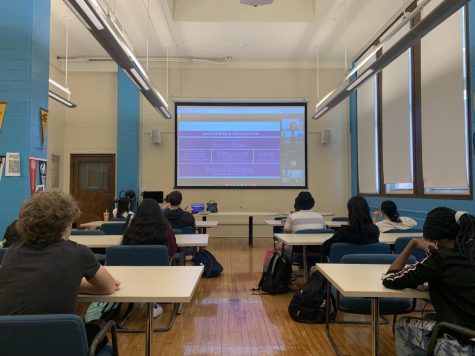Freshmen now required to learn about consent in health classes
February 14, 2020
More than 250 new laws went into effect in Illinois Jan. 1.
One of these bills was House Bill 3550, which requires Illinois schools to include an age-appropriate discussion on the meaning of consent for students in grades 6 through 12 during their sex education courses.
Bill 3550 includes “teaching that consent is a freely given agreement to sexual activity, that consent to one activity does not include consent to others, that a person’s clothing, past activity, lack of resistance and more do not constitute consent, that a person can withdraw consent at any time, and that a person cannot consent to sexual activity if the person is unable to understand due to incapacitation from drugs and alcohol, being asleep or unconscious, having a mental disability or being a minor.”
Illinois Representative Ann M. Williams, from the 11th District, filed the bill that required this.
“It seemed to me that based on recent events that you have seen on the news and in the wake of the #MeToo Movement there was a need to make sure that rather than waiting until a person was in college to explore the issue of what is and isn’t consent, that we take a look at what kids are learning in terms of consent before they get to college or before they graduate high school,” Williams said.
During her research, she saw that other states have also experienced some difficulty with teaching consent as part of their sexual education unit.
“When we looked at the sex education statute we saw that consent was barely mentioned, and when it was, it was mentioned in a very cursory way,” Williams said. “We started researching other states, and soon found out that ten or eleven states had the issue of teaching consent as part of their sex ed.”
Williams and her office became very engaged in how to best write the bill.
“We did research on what other states did and what was recommended by advocates who work in the community of dealing with survivors, or dealing with advocates for sexual assault prevention organizations, for example,” Williams said. “We talked with a lot of our partner organizations to see what they thought were the best practices in terms of educating students sixth through twelfth about the consent issue, and how to make sure it would be impactful, effective, and age appropriate.”
Williams was surprised that there was hardly any mention of consent in the Illinois statutes.
“It seems like it’s such an important yet nuanced topic,” Williams said. “We have heard growing up that no means no, but that certainly doesn’t encompass all the grey areas that surround consent. Both in regards to sexual activity and to touch anyone in any way or to engage with someone in a situation in any way.”
Some students, like Jazzabel Mantilla, Div. 054, were not surprised at the vague mention of consent in their freshman year health classes at Lane.
“I didn’t find it unusual, because I knew our sex education was lacking many things,” Mantilla said. “I just didn’t understand why it didn’t talk about consent.”
Health teacher Ms. Fregoso said sexual health is a controversial topic for many school districts nationwide, and this could explain why there is a lack of explanation of consent in the sexual education curriculum.
“Coming from a Catholic school to a Chicago Public School, it has been an eye-opener because in Catholic school, I was never taught about it,” Fregoso said. “In the public school system, though, there are so many changes happening now. I think going step by step now is more appropriate because our world is changing.”
Fregoso also wasn’t surprised by the bill not being passed much sooner than it was.
“Before, I used to fight the administration to even teach about contraceptives, but I guess one step at a time,” Fregoso said. “I’m not really surprised, because of all [the] things we weren’t supposed to teach in 2013. When I wanted to teach about doing research on different contraceptives, that was an issue.”
Fregoso said she hopes that inserting a lesson about consent into the sexual education curriculum will teach students to feel more comfortable with communicating their boundaries.
Fregoso also noticed how before the passing of the bill, teaching consent to the freshmen in her health classes, it was always in regards to a stable relationship.
“We do discuss healthy relationships, so when we think about consent during this unit, it’s more about making better choices in choosing who your partner is,” Fregoso said. “But it’s very vague. We always discuss it as a stable relationship, like we’ve known each other for a week or two or that we’ve had a mutual interest in each other before having sex with each other.”
State Rep. Ann M. Williams said she believes students will benefit from having their health teachers start a broader discussion about consent that expands beyond no means no.
“We’ve delineated a lot of specific examples of how to talk about consent,” Williams said. “We tried to build out what a comprehensive definition of consent is and can mean, so it would lead to a broader and useful discussion among students and teachers about what it might look like and how teachers will teach consent in a more broader way than just teaching them no means no.”
Williams’s hope for the bill is that consent will be understood more by students, and taught in a more comprehensive way by health teachers.
“My hope is that the bill will make people understand and utilize the definition of consent in a more comprehensive way, and avoid these situations in the future,” Williams said. “And again, give the tools to students to ensure a healthy and safe relationships for the rest of their lives, that respect their boundaries.”

Grades 6 through 12 are now required to hold a discussion about consent.





